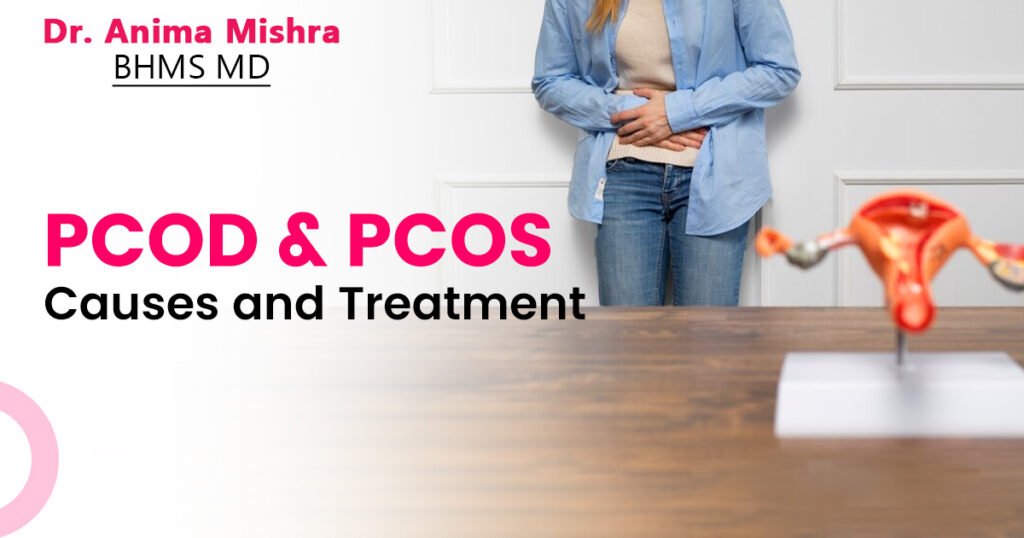Polycystic Ovary Syndrome (PCOS) and Polycystic Ovary Disorder (PCOD) are two commonly misunderstood conditions that affect millions of women worldwide. These hormonal disorders can wreak havoc on a woman’s reproductive health and overall well-being. Dr Anima Mishra, a homoeopathic expert is renowned for the treatment and cure she provides. At her Best Homeopathy Clinic in Indirapuram, she provides patient-centred care for various ailments for the overall health and well-being of the patients. In this blog, we’ll delve into the causes, symptoms, and treatment options for PCOD and PCOS, shedding light on these often overlooked but significant health issues.
What is PCOD and PCOS?
PCOD and PCOS are endocrine disorders that affect the ovaries, resulting in hormonal imbalances. While they share similar features, they are distinct conditions.
Polycystic Ovary Disorder (PCOD): PCOD is characterized by the presence of multiple cysts in the ovaries, irregular periods, and hormonal imbalances. It often manifests during puberty and can lead to fertility issues if left untreated.
Polycystic Ovary Syndrome (PCOS): PCOS encompasses a broader spectrum of symptoms, including irregular periods, excessive androgen levels, and polycystic ovaries. It is a leading cause of infertility in women and is associated with various metabolic and cardiovascular risks.
Causes of PCOD and PCOS
The exact causes of PCOD and PCOS remain unclear, but several factors are believed to contribute to their development.
- Genetics: A family history of PCOD or PCOS increases the risk of developing these conditions.
- Insulin Resistance: Insulin resistance, a condition where the body’s cells become less responsive to insulin, is commonly observed in women with PCOD and PCOS. This leads to elevated insulin levels, which in turn stimulate the ovaries to produce more androgens (male hormones).
- Hormonal Imbalance: Imbalances in hormones such as insulin, luteinising hormone (LH), follicle-stimulating hormone (FSH), and testosterone play a significant role in developing PCOD and PCOS.
- Lifestyle Factors: Poor diet, a sedentary lifestyle, obesity, and high-stress levels can exacerbate hormonal imbalances and contribute to the development of PCOD and PCOS.
Symptoms of PCOD and PCOS
Both PCOD and PCOS exhibit a range of symptoms, which may vary in severity from woman to woman. Common symptoms include:
- Irregular menstrual cycles or absence of menstruation
- Excessive hair growth (hirsutism), particularly on the face, chest, and back
- Acne and oily skin
- Weight gain or difficulty losing weight
- Hair thinning or baldness
- Difficulty conceiving or infertility
- Mood swings and depression
Treatment Options
While there is no cure for PCOD and PCOS, various treatment options can help manage symptoms and improve overall quality of life. Treatment regimens are frequently customized to meet the needs of each patient and may include:
- Lifestyle Modifications: Adopting a healthy lifestyle with a balanced diet, regular exercise, and stress management techniques can help improve symptoms and regulate menstrual cycles.
- Medications: Hormonal contraceptives, such as birth control pills, can regulate menstrual cycles and reduce androgen levels. Metformin, a medication commonly used to treat type 2 diabetes, may be prescribed to improve insulin sensitivity in women with PCOD and PCOS.
- Fertility Treatments: Women struggling with infertility due to PCOD or PCOS may benefit from fertility treatments such as ovulation induction, in vitro fertilization (IVF), or intrauterine insemination (IUI).
- Anti-androgen Medications: Medications that block the effects of androgens, such as spironolactone, can help reduce symptoms like hirsutism and acne.
- Surgery: In rare cases, surgery may be recommended to remove ovarian cysts or to perform ovarian drilling, a procedure that aims to restore ovulation by destroying a portion of the ovary with heat or laser.
Homeopathic approach for PCOD and PCOS
Homeopathy aims to stimulate the body’s innate healing ability using highly diluted substances derived from plants, minerals, or animals. Homoeopathic remedies for PCOD and PCOS may include Sepia, Pulsatilla, Lachesis, and Calcarea carbonica, among others. It’s essential to consult with a qualified homoeopathic practitioner like Dr Anima who administers the Best Homeopathy Clinic in Indirapuram for personalized recommendations and to ensure the safe and appropriate use of homoeopathic remedies.
Conclusion
PCOD and PCOS are complex hormonal disorders that require comprehensive management to address symptoms and reduce long-term health risks. Early diagnosis and intervention are crucial in preventing complications and improving outcomes for women affected by these conditions. By raising awareness, promoting research, and providing support, we can empower women to take control of their reproductive health and live fulfilling lives despite the challenges posed by PCOD and PCOS.
